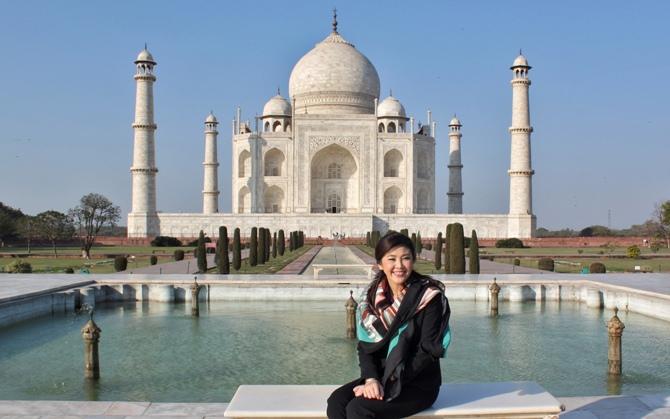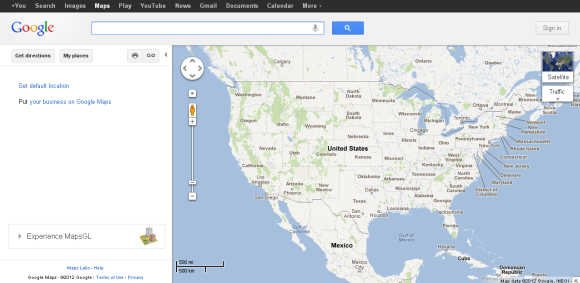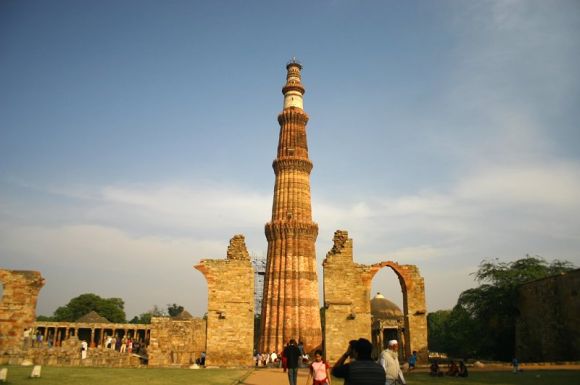 | « Back to article | Print this article |
Now, tour around Taj Mahal sitting in your living room!
Now, one can virtually visit famous monuments from the comfort of their own homes, notes Tanima Banerjee
Ever struck by the sheer amazement of the idea of taking a tour in and around the Taj Mahal and admiring its grandiose structure sitting in your living room sipping a cup of coffee?
Now, Google, in collaboration with the Archaeological Survey of India has turned this exciting thought into a reality.
For the first time, Google has brought for history and culture lovers 360-degree online imagery of iconic Indian heritage sites through the Google Trekker technology.
Now, one can virtually visit famous monuments from the comfort of their own homes without having to go all the distance.
Click NEXT to read further. . .
Now, tour around Taj Mahal sitting in your living room!
The opportunity to visit these archeological sites is available through the updated version of Google Maps through Street View and the Google Cultural Institute, which also provides information about the monuments while giving one a close tour.
It also uses 3D modelling, and other Google technologies such as YouTube to help explore and appreciate these sites via videos, photos and in-depth information.
This virtual walkthrough through the Street View option is seamless and as good as being there itself.
“When we launched this initiative five months ago, even we at Google were not sure if we could bring the Taj online.
“Today, I can say, it is a unique product. Google’s mission is to make information accessible. Google is committed to helping preserve and showcase cultural heritage across the world,” said Rajan Anandan, vice-president and managing director, Google India.
Click NEXT to read further. . .
Now, tour around Taj Mahal sitting in your living room!
The 360-degree panoramic imagery is currently available for 30 historical sites, including the Taj, Humayun’s Tomb, Qutb Minar, Red Fort, Jantar Mantar, Fatehpur Sikri, Itimad-ud-Daula, Agra Fort, Krishnagiri Fort, Rajagiri Fort, Muvar Koil & Aivar Koil, Muchu Kundesvara Temple, Perumal & ShivaTemple, Rock Cut Jain Temple, Thirumayam Fort, St George Fort, Chandragiri Fort, Amaravati Buddhist stupas and remains, Nagarjuna Konda Buddhist Stupas, Guntupalli Caves, Kanheri Caves, Lenyadri Caves, Shanirwada Fort, Aga Khan Palace, Raigad Fort, Hirakota Old Fort, Pandulena Caves, Bibi ka Makbara, Shahi Quila and Hoshang Shah's Tomb. Google is in the process to launch 70 more soon.
Google creates a dynamic, immersive online experience of historical exploration in an engaging and simple manner.
Click NEXT to read further. . .
Now, tour around Taj Mahal sitting in your living room!
The 3D imagery is sharp and the Trekker has captured the details up close, making the exploring experience as realistic as it can get.
The tour is not just limited to the monument, one can also go around the streets nearby and take the sensation of walking around the site.
One needs an Internet connection with a decent speed for a smooth tour.
Searching for the desired monument is easy.
One can view the monuments from every direction, distance and angle.
The only limitation is the lack of any audio accompaniment with this visual treat, as the complete appreciation of any archeological site is possible only when some explanation is offered for what one sees.
So, the guide only gives a limited tour.
Click NEXT to read further. . .
Now, tour around Taj Mahal sitting in your living room!
And the online experience can never match up to the real experience of standing at the great creations of the past.
Yet, what it offers is definitely a technological marvel.
Trekker technology is already available for hundreds of world heritage sites.
Anandan said, “India is unique in terms of the sheer wealth of heritage and iconic historical monuments, and it has been our privilege to work with the ASI in collecting new 360-degree photos of 30 Indian heritage sites.
“We hope the imagery, which would reach almost one-third of the world’s population, will help make India’s heritage and culture more accessible to people at home and abroad.”





